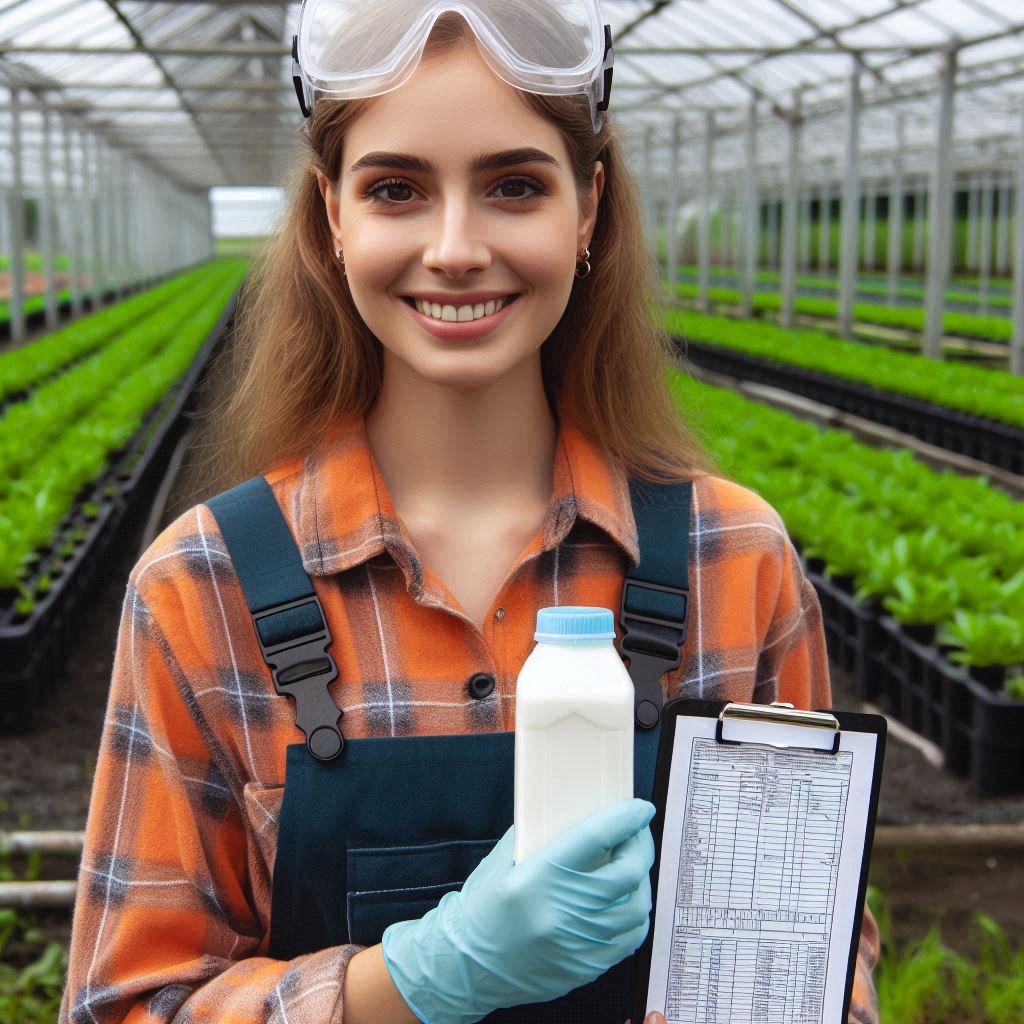Introduction
Agricultural engineers play a crucial role in designing and developing machinery, systems, and processes that enhance farming efficiency.
They work on a range of projects, from creating advanced irrigation systems to developing more efficient machinery for planting and harvesting.
Their efforts aim to optimize the use of resources and increase crop yields while minimizing environmental impact.
In today’s world, sustainable farming practices are of utmost importance.
These practices focus on maintaining soil health, conserving water, and reducing the use of harmful chemicals.
They are essential for ensuring the long-term productivity of farms and the health of our planet.
As climate change and environmental degradation become more pressing issues, sustainable farming offers a way to address these challenges.
Agricultural engineers are at the forefront of implementing these practices.
They design technologies that support precision farming, which helps farmers use resources more efficiently and reduce waste.
By integrating renewable energy sources and developing innovative waste management solutions, they contribute to reducing the overall environmental footprint of agriculture.
Role of Agricultural Engineers
Designing and Implementing New Technologies for Farming
Agricultural engineers play a crucial role in designing and implementing new technologies for farming.
They create innovative solutions to address environmental and efficiency challenges.
Engineers develop advanced machinery, such as precision planters and automated harvesters, to optimize farming operations.
These technologies reduce manual labor and increase operational efficiency.
One significant innovation is the development of smart irrigation systems.
Engineers design these systems to deliver water precisely where needed.
Smart irrigation minimizes water waste and improves crop yields.
Similarly, sensors and data analytics are integrated into farming equipment to monitor soil conditions and plant health.
This integration allows for timely adjustments to farming practices.
Another key technology is the use of drones in agriculture.
Drones provide aerial views of crops, helping engineers analyze field conditions.
They can monitor plant health, detect pests, and assess irrigation needs from above.
This information is crucial for making informed decisions about crop management.
Engineers also focus on developing sustainable energy solutions for farming.
Solar panels and wind turbines are integrated into agricultural operations to reduce reliance on fossil fuels.
These renewable energy sources power equipment and systems, contributing to overall sustainability.
Improving Efficiency and Productivity in Agricultural Practices
Improving efficiency and productivity in agricultural practices is a primary goal for agricultural engineers.
They strive to optimize every aspect of farming operations to achieve better results with fewer resources.
Advanced technologies help streamline processes and reduce waste.
One method to enhance efficiency is through the use of precision agriculture techniques.
These techniques utilize GPS and mapping technologies to manage field operations more accurately.
Precision agriculture allows for targeted application of fertilizers, pesticides, and water.
This approach reduces the overuse of resources and minimizes environmental impact.
Engineers also work on improving machinery performance to increase productivity.
Innovations in equipment design and automation contribute to faster and more efficient harvesting and planting.
Automated systems reduce the need for manual labor, allowing farmers to manage larger areas with fewer resources.
Data-driven decision-making is another key factor in improving agricultural practices.
Engineers develop systems that analyze data from various sources, such as weather forecasts and soil sensors.
This analysis helps optimize planting schedules, irrigation, and crop management strategies.
Additionally, engineers focus on reducing energy consumption in agricultural operations.
Energy-efficient machinery and systems lower operational costs and reduce environmental impact.
Engineers design technologies that maximize energy use while minimizing waste.
In review, agricultural engineers are pivotal in advancing sustainable farming practices.
By designing and implementing new technologies, they address environmental and efficiency challenges.
Their work improves productivity and resource management, contributing to a more sustainable and efficient agricultural sector.
Sustainable Farming Practices
Definition and Importance of Sustainable Farming
Sustainable farming is a method that focuses on producing food in a way that is environmentally friendly and economically viable.
It is important because it helps to preserve natural resources, reduce pollution, and maintain biodiversity.
Sustainable farming practices aim to meet the needs of the present without compromising the ability of future generations to meet their own needs.
Examples of Sustainable Farming Practices
Crop Rotation
Crop rotation involves planting different crops in the same field in sequential seasons.
This helps to improve soil quality by reducing soil erosion and nutrient depletion.
It also controls pests and diseases naturally, as different crops attract different pests, preventing the buildup of harmful organisms.
Organic Farming
Organic farming is a method of farming that relies on natural processes rather than synthetic inputs.
It focuses on using natural fertilizers and pesticides such as compost and manure.
This practice helps to reduce the use of harmful chemicals, protect soil health, and promote biodiversity.
Organic farming also produces food that is free from synthetic chemicals, making it safer for consumption and better for the environment.
Agroforestry
Agroforestry combines agriculture and forestry practices by planting trees alongside crops or livestock.
This system helps to improve soil fertility, conserve water, and provide habitat for wildlife.
Agroforestry also helps to sequester carbon from the atmosphere, mitigating climate change and enhancing ecosystem services.
Overall, agroforestry systems contribute to sustainable land use management and promote long-term agricultural productivity.
Integrated Pest Management (IPM)
IPM is a holistic approach to pest control that combines biological, cultural, and mechanical methods with chemical control as a last resort.
This practice helps to minimize the use of pesticides and reduce their negative impact on the environment.
By using IPM, farmers can manage pest populations effectively while maintaining a balance with natural predators and beneficial insects.
IPM also helps to protect human health and ecosystem diversity by promoting sustainable farming practices.
In general sustainable farming practices play a crucial role in ensuring the long-term viability of agriculture.
By adopting these methods, farmers can protect the environment, conserve natural resources, and support food security for future generations.
It is essential for agricultural engineers to incorporate sustainable farming practices in their work to promote a more resilient and sustainable food system for the planet.
Read: Comparison: Architecture Styles across American Regions.
Challenges in Sustainable Farming
When it comes to sustainable farming practices, agricultural engineers play a crucial role in finding solutions to challenges that hinder the progress of sustainable agriculture.
In this section, we will discuss some of the key challenges faced in sustainable farming and how agricultural engineers can address them.
Environmental impact of conventional farming methods
- One of the major challenges in sustainable farming is the environmental impact of conventional farming methods.
- Conventional agriculture practices often rely on heavy use of chemical fertilizers and pesticides, which can lead to soil degradation and water pollution.
- These practices also contribute to greenhouse gas emissions, which contribute to climate change and global warming.
- Agricultural engineers can work towards developing eco-friendly alternatives such as organic farming methods, precision agriculture, and integrated pest management.
- By promoting the use of sustainable practices, agricultural engineers can help reduce the environmental impact of farming and create a more sustainable future for agriculture.
Need for innovation and adoption of sustainable practices
- Another challenge in sustainable farming is the need for innovation and adoption of sustainable practices.
- Many farmers may be resistant to change due to concerns about cost, risk, or lack of knowledge about sustainable practices.
- Agricultural engineers can play a key role in educating farmers about the benefits of sustainable practices and helping them implement these practices on their farms.
- Through research and development, agricultural engineers can also help create new technologies and tools that can improve the efficiency and sustainability of farming practices.
- By fostering a culture of innovation and collaboration, agricultural engineers can drive positive change in the agriculture industry and promote the widespread adoption of sustainable farming practices.
Generally, while there are challenges to overcome in sustainable farming, agricultural engineers have the expertise and skills to find solutions that can lead to a more sustainable and environmentally friendly agriculture industry.
By addressing the environmental impact of conventional farming methods and promoting the adoption of innovative sustainable practices, agricultural engineers can help pave the way for a more sustainable future for farming.
Transform Your Career Today
Unlock a personalized career strategy that drives real results. Get tailored advice and a roadmap designed just for you.
Start NowRead: The Role of NCARB in US Architecture Licensing.
Role of Agricultural Engineers in Sustainability
Developing New Technologies for Water Conservation and Soil Health
Water conservation is essential for sustainable farming.
Agricultural engineers are at the forefront of developing technologies that optimize water use.
Innovations such as precision irrigation systems ensure that crops receive the exact amount of water they need.
These systems use sensors and data analytics to adjust water delivery based on real-time conditions.
This approach not only conserves water but also enhances crop yields.
Soil health is another critical aspect of sustainable farming.
Engineers design technologies that improve soil management practices.
Examples include advanced soil sensors that monitor moisture levels, nutrient content, and pH.
These sensors provide farmers with valuable data, allowing for more precise application of fertilizers and amendments.
This targeted approach reduces waste and minimizes environmental impact.
Collaborating with Farmers to Implement Sustainable Practices
Collaboration between agricultural engineers and farmers is essential for the successful implementation of sustainable practices.
Engineers work closely with farmers to understand their unique challenges and needs.
They provide practical solutions that align with the farmers’ goals and resources.
For instance, engineers might conduct field trials to test new technologies and assess their effectiveness.
They also offer training and support to ensure farmers can effectively use these technologies.
This hands-on approach helps bridge the gap between innovation and practical application.
Furthermore, agricultural engineers assist in integrating sustainable practices into existing farming operations.
They help farmers transition to techniques such as reduced tillage, cover cropping, and integrated pest management.
These practices enhance soil health, reduce erosion, and lower chemical usage.
In addition to technical support, agricultural engineers also facilitate access to funding and resources for sustainable projects.
They guide farmers through grant applications and provide information on financial incentives for adopting green technologies.
This support is crucial for overcoming financial barriers to implementing sustainable practices.
Read: From Intern to Lead: Climbing the Software Ladder in the US

Benefits of Sustainable Farming
Preservation of Natural Resources
One key focus of agricultural engineers is the preservation of natural resources.
They design systems that optimize water use, such as advanced irrigation techniques.
Drip irrigation and precision watering systems minimize water waste by delivering the exact amount needed to crops.
This approach conserves water, reduces runoff, and prevents soil erosion.
Agricultural engineers also work on soil management practices.
They develop technologies for soil monitoring and analysis, which helps in understanding soil health.
Techniques like reduced tillage and cover cropping maintain soil structure and fertility.
This reduces the need for synthetic fertilizers, which can lead to environmental degradation.
Energy efficiency is another area where agricultural engineers make an impact.
They design and implement renewable energy systems, such as solar and wind power, for agricultural operations.
These systems reduce reliance on fossil fuels and lower greenhouse gas emissions.
By integrating renewable energy, they help create more sustainable farming practices.
Improved Crop Quality and Yield
In addition to resource conservation, agricultural engineers focus on improving crop quality and yield.
Precision agriculture is a prime example of how technology enhances farming efficiency.
Engineers develop GPS-guided machinery and sensors that provide real-time data on crop conditions.
This data allows farmers to make informed decisions about planting, fertilizing, and harvesting.
Modern planting technologies, such as precision seeders, ensure optimal plant spacing and depth.
This improves crop uniformity and maximizes yield potential.
Similarly, automated systems for pest and weed control reduce the need for chemical interventions, leading to healthier crops and higher quality produce.
Agricultural engineers also work on advancements in crop breeding and genetic engineering.
They help develop crops that are more resistant to pests, diseases, and environmental stressors.
These innovations contribute to higher yields and better quality crops, which are crucial for feeding a growing global population.
Essentially, agricultural engineers are pivotal in promoting sustainable farming practices.
Their efforts in preserving natural resources and enhancing crop quality are vital for the future of agriculture.
By focusing on resource conservation and technological innovation, they help create farming systems that are both efficient and environmentally friendly.
Their work supports the long-term sustainability of agriculture and contributes to global food security.
Read: Decoding the Ethics & Responsibilities of US Civil Engineers
Impact of Sustainable Practices on Food Security
Ensuring Long-Term Food Supply for a Growing Population
Agricultural engineers play a vital role in ensuring a long-term food supply for the growing global population.
Their expertise is crucial in developing sustainable farming practices that address both current and future food needs.
As the world‘s population continues to expand, the demand for food increases.
Agricultural engineers work to meet this demand while minimizing the environmental impact of farming.
Innovative technologies and methods designed by agricultural engineers help increase crop yields and improve efficiency.
Precision farming techniques, such as GPS-guided machinery and soil sensors, enable farmers to use resources more effectively.
These technologies optimize the use of water, nutrients, and energy, leading to higher productivity and less waste.
Sustainable practices developed by agricultural engineers also focus on enhancing soil health.
Techniques such as crop rotation, cover cropping, and reduced tillage help maintain soil fertility and structure.
Healthy soils are essential for growing robust crops and ensuring a steady food supply.
By improving soil management practices, agricultural engineers contribute to long-term agricultural productivity and resilience.
Showcase Your Business Today
Reach thousands of readers actively exploring professional services. Publish your business profile and grow your audience now.
Publish NowMoreover, agricultural engineers are at the forefront of developing new crop varieties that are more resistant to pests and diseases.
These innovations help reduce crop losses and ensure a stable food supply.
Advances in biotechnology and genetic engineering provide farmers with tools to grow crops that can withstand environmental stresses, such as drought and extreme temperatures.
Reducing Dependence on Chemical Inputs in Farming
Reducing reliance on chemical inputs is another crucial aspect of sustainable agriculture.
Agricultural engineers are instrumental in developing alternatives to synthetic fertilizers and pesticides.
They focus on creating systems that enhance natural processes and reduce the need for chemical interventions.
One approach is the use of biological pest control methods.
Agricultural engineers design and implement systems that utilize natural predators to manage pest populations.
This method reduces the need for chemical pesticides and supports ecosystem health.
Another strategy involves optimizing nutrient management.
Engineers develop precision application technologies that apply fertilizers in a targeted manner, reducing runoff and minimizing environmental impact.
Techniques such as nutrient recycling and organic fertilization further decrease dependence on synthetic chemicals.
In addition, agricultural engineers work on integrating advanced monitoring systems to track soil and crop health.
These systems provide real-time data, allowing farmers to make informed decisions and apply inputs only when necessary.
This approach reduces over-application and ensures that chemicals are used more efficiently.
By promoting practices such as integrated pest management, organic farming, and sustainable soil management, agricultural engineers contribute to reducing the environmental footprint of agriculture.
Their innovations support a shift towards more sustainable farming practices that minimize chemical use and protect natural resources.
Overcoming Barriers to Sustainable Farming
Education and Awareness among Farmers
One of the major barriers to sustainable farming practices is the lack of education and awareness among farmers.
Many farmers may not be aware of the benefits of sustainable agriculture or how to implement sustainable practices on their farms.
There is a need for more educational programs and resources to help farmers understand the importance of sustainable farming.
Workshops, training sessions, and extension services can play a crucial role in educating farmers about sustainable practices.
By increasing awareness and providing the necessary knowledge, farmers can make informed decisions about adopting sustainable farming methods.
Government Policies and Support for Sustainable Agriculture
Another barrier to sustainable farming is the lack of government policies and support for sustainable agriculture.
Governments play a key role in creating a conducive environment for sustainable farming practices to thrive.
There is a need for policymakers to develop and implement policies that promote sustainable agriculture and provide support to farmers.
Incentives such as grants, subsidies, and tax breaks can encourage farmers to adopt sustainable practices on their farms.
Government programs that offer technical assistance and financial support can help farmers transition to sustainable farming methods.
Combating Barriers through Collaboration
To overcome these barriers, it is essential for stakeholders to collaborate and work together towards promoting sustainable farming practices.
Farmers, government agencies, non-profit organizations, and agricultural engineers can join forces to address these challenges.
Partnerships and collaborations can help in sharing knowledge, resources, and best practices for sustainable agriculture.
By working together, stakeholders can create a supportive ecosystem that encourages the adoption of sustainable farming practices.
Investing in Research and Innovation
Research and innovation play a crucial role in overcoming barriers to sustainable farming practices.
Investing in research can help in developing new technologies and techniques that promote sustainability in agriculture.
Agricultural engineers can contribute to research efforts by designing and implementing innovative solutions for sustainable farming.
Continuous research and innovation are essential for addressing challenges and finding sustainable solutions for the future of agriculture.
In short, overcoming barriers to sustainable farming practices requires a multi-faceted approach that involves education, policy support, collaboration, and innovation.
By addressing these barriers effectively, we can create a more sustainable and environmentally friendly agricultural sector that meets the needs of the present and future generations.
Find Out More: Robotics Engineer vs. AI Engineer: Key Differences
Conclusion
Agricultural engineers play a pivotal role in advancing sustainable farming practices.
Their expertise is essential in developing and implementing technologies that minimize environmental impact while maximizing agricultural productivity.
By designing systems that optimize resource use‘such as water-efficient irrigation methods and precision farming techniques‘agricultural engineers help reduce waste and conserve critical resources.
Their innovations contribute significantly to improving soil health, reducing the carbon footprint of farming operations, and enhancing overall efficiency.
The importance of their work cannot be overstated.
Sustainable farming practices are crucial for addressing global food security challenges and mitigating the effects of climate change.
Agricultural engineers are at the forefront of these efforts, applying their knowledge to create solutions that balance productivity with environmental stewardship.
Their contributions support the long-term viability of agriculture and promote practices that benefit both current and future generations.
Encouraging further research and development in this field is essential for continued progress.
Investing in new technologies and methodologies will drive significant improvements in sustainability and efficiency.
Continued exploration and innovation are necessary to keep pace with the evolving demands of agriculture and to address emerging environmental challenges.
Agricultural engineers should be proactive in pushing the boundaries of what is possible, seeking out new solutions, and refining existing practices.
[E-Books for Sale]
The Big Book of 500 High-Paying Jobs in America: Unlock Your Earning Potential
$19.99 • 500 High-Paying Jobs • 330 pages
Explore 500 high-paying jobs in America and learn how to boost your career, earn more, and achieve success!
See All 500 High-Paying Jobs of this E-Book
1001 Professions Without a Degree: High-Paying American Jobs You Can Start Now
$19.99 • 1001 Professions Without a Degree • 174 pages
Discover 1001 high-paying jobs without a degree! Unlock career tips, skills, and success strategies for just $19.99!




